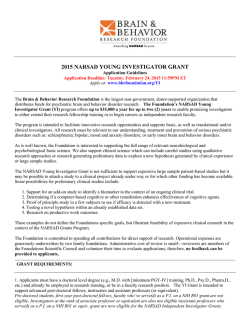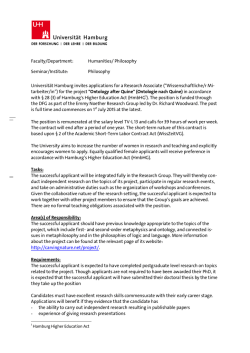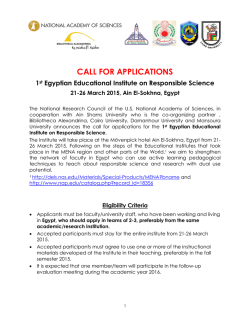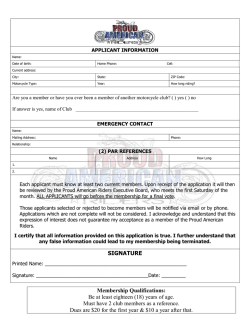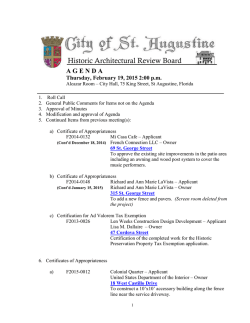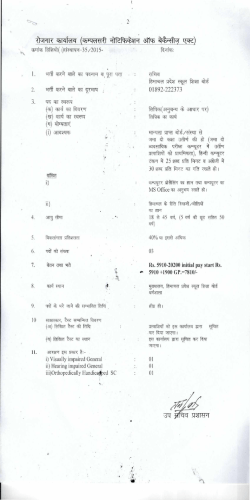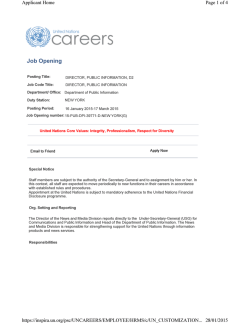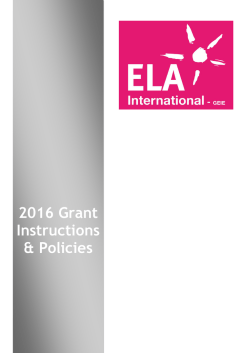
2016 NARSAD YOUNG INVESTIGATOR GRANT
2016 NARSAD YOUNG INVESTIGATOR GRANT Application Guidelines Application Deadline: Wednesday, February 24, 2016, 11:59 PM ET Apply at: www.bbrfoundation.org/YI The Brain & Behavior Research Foundation is the largest non-government, donor-supported organization that distributes funds for psychiatric brain and behavior disorder research. The Foundation’s NARSAD Young Investigator Grant (YI) program offers up to $35,000 a year for up to two (2) years to enable promising investigators to either extend their research fellowship training or to begin careers as independent research faculty. The program is intended to facilitate innovative research opportunities and supports basic, as well as translational and/or clinical investigators. All research must be relevant to our understanding, treatment and prevention of serious psychiatric disorders such as: schizophrenia; bipolar; mood and anxiety disorders; or early onset brain and behavior disorders. As is well known, the Foundation is interested in supporting the full range of relevant neurobiological and psychobiological basic science. We also support clinical science which can include careful studies using qualitative research approaches or research generating preliminary data to explore a new hypothesis generated by clinical experience or large sample studies. The NARSAD Young Investigator Grant is not sufficient to support expensive large sample patient-based studies but it may be possible to attach a study to a clinical project already under way or for which other funding has become available. Some possibilities for preliminary clinical studies include: 1. Support for an add-on study to identify a biomarker in the context of an ongoing clinical trial. 2. Determining if a computer-based cognitive or other remediation enhances effectiveness of cognitive agents. 3. Proof of principle study in a few subjects to see if efficacy is detected with a new treatment. 4. Testing a novel hypothesis within an already established data set. 5. Research on productive work outcomes. These examples do not define the Foundations specific goals, but illustrate feasibility of expensive clinical research in the context of the NARSAD Grants Program. The Foundation is committed to spending all contributions for direct support of research. Operational expenses are generously underwritten by two family foundations. Administrative cost of review is small—reviewers are members of the Foundations Scientific Council and volunteer their time to evaluate applications; therefore, no feedback can be provided to applicants. GRANT REQUIREMENTS: 1. Applicants must have a doctoral level degree (e.g., M.D. with [minimum PGY-IV] training, Ph.D., Psy.D., Pharm.D., etc.) and already be employed in research training, or be in a faculty research position. The YI Grant is intended to support advanced post-doctoral fellows, instructors and assistant professors (or equivalent). Pre-doctoral students, first year post-doctoral fellows, faculty who’ve serve(d) as a P.I. on a NIH R01 grant are not eligible. Investigators at the rank of associate professor or equivalent are also not eligible (assistant professors who serve(d) as a P.I. on a NIH R01 or equiv. grant are now eligible for the NARSAD Independent Investigator Grant); 1 2. Applicants must have an on-site mentor or senior collaborator who is an established investigator in areas relevant to psychiatric disorders. The mentor/sponsor role is usually extensive for fellowship extension (mentor), and more senior colleague/advisor (sponsor) for an applicant prepared to initiate independent science. 3. Applicants may only apply twice for an initial NARSAD Young Investigator Grant. 4. Applications must be submitted by Wednesday, February 24, 2016, no later than 11:59 PM Eastern Time. 5. Funding is for one or two years and is up to $35,000 per year. The Foundation does not pay institutional overhead on the NARSAD Young Investigator Grant Program. 6. The Foundation allows considerable flexibility in the use of funds: equipment, stipends, etc., are all acceptable as long as the support is in the service of the NARSAD Young Investigator Grant research project. 7. Applicants are eligible for a maximum of two NARSAD Young Investigator Grants. Prior grantees at the advanced post-doctoral, instructor or assistant professor level can apply for a second grant. However, grants cannot overlap in time, only one application for a second NARSAD YI Grant is permitted, and substantial productivity on the first grant must be documented and the applicant must show how a second grant will facilitate competition for a NIH R01 grant or equivalent. 8. Only one principal investigator (P.I.) is allowed per application. 9. Grant approval notifications will be mailed in August, 2016. It is the Foundations policy to provide no feedback on applications, other than funding notification. Earliest grant start date is January 15, 2017. APPLICATION REQUIREMENTS: Applications must be submitted online via www.bbrfoundation.org/YI. Applicants must first complete the online form, and then upload the application in a single PDF document. Each section must be on a separate page. Please follow the order of the application as follows and adhere to the maximum number of pages allowed for each section indicated in parentheses. Label each section and include applicant’s name in upper right corner of each page. Please follow NIH format guidelines: Arial, Helvetica, Palatino Linotype, or Georgia fonts with a font size of 11 or larger with minimum of ½ inch margins. (a) Face Sheet (1 page - Pease refer to the last page) - listing of all Scientific Council Member can be found here. (b) Abstract (less than 500 words) – a summary of the research project written in layman’s terms. If the proposal is funded, this material may be used in the Foundations announcements; (c) Applicant C.V. (4 pages) – NIH biosketch OR the biography portion of the curriculum vitae only, with current grant support listed. (d) Proposal (2 pages with no appendices) – a letter from the applicant outlining training and/or project goals that will be accomplished within the grant period. One representative project should be described in sufficient detail to elucidate hypothesis, significance, and central methodology. Figures, tables, diagrams, et.al., must be included within the 2-page limit. (e) Research Training/Career Plans (½ page) – brief description of present or recently completed research training, and applicant's future career plans. This grant is intended for fellowship extension or early faculty support. 2 (f) Budget (1 page/itemized table format in US $) – a budget description specifying the amount requested with a brief justification and indicating whether applicant is applying for a one- or two- year grant. Requests must not exceed $35,000 per year. The budget statement should define the unique contribution of this grant to applicant's research activities and note the impact of this grant on other institutional support available to applicant. Specific assurance that receipt of this grant will not result in duplication of funding or reduction of support from the host institution is required. The applicant's research funding must be listed, and should include any support pending, as well. (g) Mentor/Sponsor Letter (1 page/additional page if there are two mentors) – a letter from an on-site mentor stating how the grant will enhance applicant's training or facilitate transition to an independent investigator of relevance to the Foundation’s mission and describing the mentor's commitment to facilitate the specific research proposal. A second letter from an additional mentor may be included if the mentor provides an area of expertise not otherwise available. If a second mentor letter must be included, it must explain the second mentor’s unique role in the project and not simply be a letter of support. A sponsor letter for more advanced applicants needs to specify departmental/institutional support for the applicant including percent time research protected. (h) Mentor C.V. (4 pages or 8 pages if there are two mentors) – NIH biosketch OR the biography portion of the curriculum vitae only. (i) References (1 page, optional) – a listing up to ten bibliographical references may be included. (j) Collaborator Letter (1 page, optional) – letter of commitment from essential project collaborators (not letter of reference), addressed to the applicant, briefly explaining the specific contribution and confirming a willingness to collaborate. (k) Institutional Assurance Letter (1 page) – which includes the applicant’s institutional signature (i.e., Grants & Contracts/Sponsored Research Office), thereby signifying the institution’s acceptance and acknowledgment of these guidelines. ** IRB/IACUC approval for human and animal subjects must be verified at the time of the Grant (do not include IRB/IACUC with application), as well as institutional acceptance of the Foundation’s Grant Agreement. ** In fairness to all applicants, supplemental material (i.e., appendices) will NOT be considered in the review process. Additionally, any material exceeding the specified length will be discarded. Applications not following the guidelines will be administratively rejected. ** Funds will be granted to universities, institutions or medical research centers operating in the United States, Canada, or any foreign countries. All international applicants are welcome to apply. Researchers need not be U.S. citizens. For inquiries, please contact: Address: 90 Park Avenue, 16th Floor, New York, NY 10016 Phone: (800) 829-8289 Fax: (646) 681-4891 Email: [email protected] (preferred) 3 BRAIN & BEHAVIOR RESEARCH FOUNDATION YOUNG INVESTIGATOR GRANT FACE SHEET Applicant Information (Please fill out all relevant information below) Principal Investigator Position Title Institution For MD Applicants, year residency was completed: For PhD Applicants, year degree was awarded: *For MD/PhD applicants please provide both years in the above designated areas. Mentor/Institution (Please list primary mentor name first) Number of peer-reviewed papers (Total/first authored/last authored): Please identify all BBRF Scientific Council Members who will be in conflict with your application (i.e. your mentor, collaborators, same institution etc.) Complete list of members can be found here. *If there is no conflict please list n/a Specialized Population Addiction ADHD Anxiety Disorders Bipolar Disorder Depression OCD PTSD Schizophrenia Other:
© Copyright 2026
